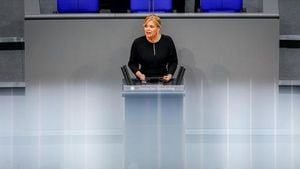Anouk, the renowned Dutch singer, has made headlines after refusing to participate in a live audition for the AvroTros selection committee for the Eurovision Song Festival. This decision, revealed by her manager Kees de Koning in an article published on May 8, 2025, on the website of Het Parool, has stirred discussions among fans and industry insiders alike.
The 50-year-old artist, known for her powerful vocals and rock music style, deemed the mandatory live performance unnecessary. "Everyone knows Anouk can sing live," her manager stated, emphasizing that they felt the audition was merely a formality. Despite the standard procedure that requires all candidates to perform live for the selection committee, Anouk opted to skip this step when she submitted her rock track "Where the Mind Goes" for consideration.
According to de Koning, Anouk had planned a vacation and found it unreasonable to cancel it for the audition. He explained, "We thought it was unnecessary to prove that she could sing live. Anouk is Anouk; you don’t audition for that." This sentiment resonates with many of her fans, who believe that her established reputation should suffice.
However, this decision may have cost her a chance at representing the Netherlands again at the prestigious music festival. Anouk had previously represented her country in 2013 with the song "Birds," which secured an impressive ninth place in Malmö, Sweden. Since then, she has expressed a desire to return to the Eurovision stage, making her recent refusal all the more surprising.
While AvroTros has not officially commented on Anouk's situation, reports suggest that her absence from the audition process had a significant impact on the selection outcome. Sources close to Anouk indicate that she finished in second place, just behind the younger singer Claude. Reflecting on the results, Anouk shared her disappointment during an interview with RTL Boulevard, stating, "I find it difficult. But the choice has fallen on someone else."
The controversy surrounding Anouk's decision highlights a broader conversation within the Eurovision community. The introduction of mandatory live auditions was a direct response to the criticism faced by the 2023 entrants Mia & Dion, whose vocal performances did not meet expectations. This policy aims to ensure that all performers are adequately prepared for the spotlight, reducing the likelihood of surprises on stage.
Despite her talent and past successes, Anouk's choice to skip the live audition has sparked mixed reactions among her fanbase. Some fans argue that her status as a seasoned artist should exempt her from such requirements, while others contend that rules should apply equally to all participants, regardless of their fame. This division reflects the ongoing tension between established artists and newer talents in the competitive landscape of the Eurovision Song Festival.
As the selection process unfolded, Anouk reportedly went through most of the required steps, including discussions with a psychologist, but ultimately chose to bypass the crucial live performance. This decision proved to be pivotal, as she later learned through informal channels that she had narrowly missed out on the opportunity to represent the Netherlands.
In the aftermath of the selection, Claude, known for his upbeat track "C’est La Vie," will take the stage in Basel, Switzerland, while Anouk's absence raises questions about the future of her career in the Eurovision context. Anouk acknowledged the committee's choice but did not shy away from expressing her thoughts on the decision. "It’s very safe. He’s young and fresh. It’s no risk. I don’t think he’ll say or do anything controversial. And it’s just a fun, cheerful song," she critiqued, suggesting that while Claude may be a safe choice, he lacks the rock edge that she brings to the table.
Reflecting on her own past experience, Anouk noted that in 2013, when she performed "Birds," there were no auditions required, and her talent spoke for itself. The current rules, while designed to ensure quality, seem to have created a barrier for artists of her caliber.
As fans continue to debate the implications of Anouk's decision, it remains clear that her absence from the Eurovision stage this year has left a significant void. The discussions surrounding her refusal to audition have reignited interest in her music and career, prompting many to wonder if she will seek another opportunity to represent the Netherlands in the future.
In conclusion, Anouk's refusal to participate in the live audition process for the Eurovision Song Festival has sparked a significant discussion about the evolving nature of talent representation at this iconic event. While the mandatory auditions aim to elevate performance standards, they may inadvertently sideline established artists who have already proven their worth on the global stage. As the Eurovision community reflects on these changes, Anouk's legacy and influence in the music industry remain undeniable.





